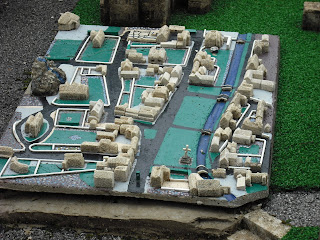Basically, it's where we live.
We don't seem to notice lotsa things almost in our own back yard. Stuff people come from all over the place to see, so it's a bit daft not to play the tourista in you're own ghetto, innit?.
And because we can't really afford a holiday at the moment, as well as having the cute, drooly shackle of a baby in the house, we are having a staycation. This is holiday speak for not going anywhere even though you've got a week of annual leave booked.
Well, this isn't exactly true.
When deciding on a staycation, you must still make the effort to go places, and to experience stuff that you know about yet rarely do, otherwise, well, you're just staying at home really.
For instance, about forty minutes from us is Bourton-on-the-Water, which has got a bird park and a model village.
Bird parks are cool. They've got birds in them, and birds are pretty interesting, especially if they talk, or scream, or are brightly coloured, or eat other creatures, or are bloody huge. In fact the best bird would combine all of these traits and be some sort of meat-eating, osprey-sized super parrot. I was excited.
They didn't have a carnivorous super-parrot, which was a touch disappointing, but on the whole it's a nice place. Lots of birds.
Model villages though. Are they cool?
Well, seeing as I have never, in all my decades, been to a model village, I didn't know. And as this one was right there and I had a kid with me, it seemed an opportune moment to go and have a look.
It messed with my mind man!
First of all, there is the ominous photos of your darling, tiny cherub looking like Sprogzilla:

I was tempted to 'Shop in some lasers coming out of his eyes, and then stick a tiny picture of Tom Cruise flailing about with his hair on fire, but when I say Phototshop I mean Microsoft Paint, and it's a bit of a faff. You'll just have to use your imagination.
Go on. Picture Tom. Picture his hair. Now . . . WOOF! And off he goes yay!
The model village uses Bourton itself as a template, although only roughly as the ephemeral structures of humanity are wont to change, so it's not entirely accurate. I didn't see a tiny bird park, which was a pity. I considered suggesting they set one up, maybe using painted wasps as the birds for lifelike realism.
Other than that, the buildings are startlingly realistic, and it's a little surreal watching folk wander about, towering over them. As I hadn't got specific permission to show peoples faces in this blog, I have blocked them out with appropriate ogre masks using the magic of awesome Paint skillz, which I feel is artistically sensitive to the context:
 The village had another trick up its sleeve, which I quite liked. In one corner, behind the model of the pub in which the model village is situated in real life, is a model of the model village:
The village had another trick up its sleeve, which I quite liked. In one corner, behind the model of the pub in which the model village is situated in real life, is a model of the model village: Now, that was bit cool.
Now, that was bit cool.Hang on though. Look in the corner of the model model village:

It's a model of the model model village!
A model model model village.
And look! By Neptune's Soggy Beard, could it possibly be? Yes, yet another model of the model model model village:

Okay, my inner geek did like that quite a bit, and I might just have tried to get close to see if there was yet another microcosmic representation of the model village. But there wasn't. Or at least I couldn't see it and presumed that there wasn't, which raises a few existential questions about things being there if you can't see them.
This isn't the same as the question "If a tree falls in the wood and no-one witnesses it, does it make a noise?" because the answer to that is patently no. It makes lots of sound waves, which travel through the air as pressure differences, but only become audible when they hit a listening device such as an ear. Never understood why that was a conundrum. It's just a matter of physics. Which is possibly what everything is.
Anyway, my inner child struggled up past layers of fossilised responsibility and the diamond-hard strata of mature levelheadedness that usually make up my personality, to surface briefly in my psyche, and I imagined tiny people looking up at not so tiny people, who were looking up at slightly bigger people, who in turn gazed fearfully up at even bigger folk, and so ad infinitum, until at last they got to the pinnacle of the event, the ultimate being, the one looking down at all of them and their tiny lives, an indulgent smile playing on a beatific face, like the very sun itself looking down on them from on high.
MEEEEEEEEE!
With the universe constantly making us feel small by being all mind-bendingly huge and that, it was nice to be in a place which, quite literally, bigs you up a bit.
Oh, go on then:
 Run, Tom, Run!
Run, Tom, Run!





